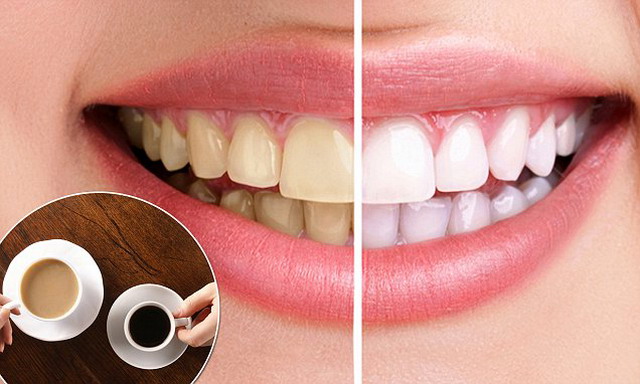Does Iced Coffee Stain Teeth? Exploring the Effects of Cold Brew on Dental Health
Does Iced Coffee Stain Teeth
Iced coffee is a popular beverage among coffee drinkers, especially during the summer months. However, some people may be concerned about whether iced coffee can stain their teeth. The answer is yes, iced coffee can stain teeth due to its acidity and tannin content. If consumed regularly, it can lead to discoloration of the teeth.
Understanding teeth stains is important in preventing them. Teeth stains can be caused by a variety of factors, including food and drink consumption, smoking, and poor dental hygiene. Surface stains, also known as extrinsic stains, are caused by external factors such as food and drink consumption. On the other hand, intrinsic stains are caused by internal factors such as aging or medication use. In the case of iced coffee, the beverage’s dark color, acidity, and tannin content can lead to surface stains on the teeth.
Key Takeaways
- Iced coffee can stain teeth due to its acidity and tannin content.
- Teeth stains can be caused by a variety of factors, including food and drink consumption, smoking, and poor dental hygiene.
- Preventing teeth stains involves regular dental care, limiting consumption of staining foods and drinks, and seeking professional teeth whitening options when necessary.
Understanding Teeth Stains
When it comes to teeth staining, it’s important to understand that there are different types of dental stains and causes of tooth discoloration. Here are the most common types and causes:
Types of Dental Stains
- Extrinsic Stains: These are surface stains that occur on the outer layer of the tooth (enamel) and can be caused by consuming foods and drinks that are known to stain teeth, such as coffee, tea, red wine, and dark-colored berries. Coffee stains on teeth are a common example of extrinsic stains.
- Intrinsic Stains: These are stains that occur inside the tooth and are caused by factors such as aging, trauma, and certain medications. Intrinsic stains can be more difficult to treat than extrinsic stains.
Causes of Tooth Discoloration
- Enamel Staining from Iced Coffee: Iced coffee can stain teeth due to its acidity and tannin content. The acidity of coffee can erode the enamel, making it more susceptible to staining. Additionally, the tannins in coffee can bind to the enamel, causing discoloration.
- Poor Oral Hygiene: Poor oral hygiene can lead to the buildup of plaque and tartar on the teeth, which can cause discoloration. Brushing and flossing regularly and visiting the dentist for regular cleanings can help prevent tooth discoloration.
- Smoking and Tobacco Use: Smoking and using tobacco products can cause tooth discoloration, as well as other oral health problems.
- Aging: As people age, the enamel on their teeth can wear down, making the teeth more susceptible to staining.
- Genetics: Some people are more prone to tooth discoloration due to genetics.
In conclusion, understanding the types and causes of tooth discoloration can help individuals prevent and treat stains on their teeth. By maintaining good oral hygiene, avoiding foods and drinks that are known to stain teeth, and visiting the dentist regularly, individuals can keep their teeth looking bright and healthy.
The Impact of Iced Coffee on Dental Health
Iced coffee is a popular beverage that many people enjoy, especially during the hot summer months. However, some people may be concerned about the potential impact that iced coffee can have on their dental health. In this section, we will explore the effects of iced coffee on enamel and dental health.
Effects of Iced Coffee on Enamel
Enamel is the hard, outer layer of the teeth that protects them from damage. However, enamel can become weakened over time due to a variety of factors, including exposure to acidic foods and beverages like iced coffee. Iced coffee contains high levels of acidity, which can erode the enamel on the teeth and lead to tooth sensitivity, discoloration, and even cavities.
To minimize the impact of iced coffee on enamel, it is recommended to drink it in moderation and avoid sipping it slowly over an extended period. Drinking iced coffee through a straw can also help prevent direct contact with the teeth, reducing the risk of enamel erosion.
Coffee and Dental Health
While iced coffee can have a negative impact on enamel, it is important to note that coffee also contains compounds that can benefit dental health. For example, coffee contains polyphenols, which are antioxidants that can help reduce inflammation and prevent the growth of harmful bacteria in the mouth.
In addition, some studies have suggested that coffee consumption may be associated with a reduced risk of gum disease, which is a common oral health problem that can lead to tooth loss and other complications.
Overall, while iced coffee can have a negative impact on dental health, it is possible to enjoy it in moderation while still maintaining good oral hygiene habits. Regular brushing, flossing, and dental check-ups are essential for maintaining healthy teeth and gums, regardless of what beverages you consume.
Prevention Strategies for Coffee Drinkers
Coffee is a popular beverage that can cause teeth staining. However, there are ways to prevent coffee stains on teeth. In this section, we will discuss some prevention strategies that coffee drinkers can use to minimize the risk of teeth discoloration.
Dietary Adjustments
Dietary adjustments can help prevent coffee stains on teeth. Adding milk to coffee can reduce the staining effect of coffee. This is because milk contains casein, a protein that binds to the tannins in coffee and prevents them from sticking to teeth. Drinking coffee through a straw can also help reduce the contact between coffee and teeth, thus minimizing the risk of staining.
It is also important to limit the consumption of coffee and other staining beverages. Drinking water after consuming coffee can help rinse off the pigments and tannins that can cause teeth discoloration.
Oral Hygiene Practices
Good oral hygiene practices can also help prevent coffee stains on teeth. Brushing and flossing teeth regularly can help remove the plaque and food particles that can contribute to discoloration. It is recommended to wait at least 30 minutes after consuming coffee before brushing teeth, as brushing immediately after drinking coffee can actually spread the stains.
Using a whitening toothpaste can also help remove surface stains on teeth. However, it is important to note that whitening toothpaste can only remove surface stains and cannot change the natural color of teeth.
In conclusion, preventing coffee stains on teeth requires a combination of dietary adjustments and good oral hygiene practices. By following these prevention strategies, coffee lovers can enjoy their favorite beverage without worrying about teeth discoloration.
Daily Dental Care for Coffee Enthusiasts
As a coffee enthusiast, it is essential to take good care of your teeth to prevent staining. Below are some effective cleaning techniques and iced coffee oral hygiene tips to help maintain a healthy, white smile.
Effective Cleaning Techniques
Regular brushing and flossing are essential for maintaining healthy teeth and gums. Brushing twice a day with a fluoride toothpaste and flossing at least once a day can help remove plaque and prevent tooth decay. It is recommended to brush your teeth for at least two minutes, paying extra attention to hard-to-reach areas.
In addition to brushing and flossing, using a mouthwash can help kill bacteria and freshen breath. However, it is important to choose a mouthwash that is alcohol-free to prevent dry mouth, which can lead to tooth decay.
Iced Coffee Oral Hygiene Tips
Drinking iced coffee through a straw can help minimize teeth’s exposure to the staining effects of the beverage. It is also recommended to rinse your mouth with water after drinking coffee to help remove any residue.
Adding milk to your coffee can help reduce the staining power of coffee. Milk contains calcium, which can neutralize the acid in coffee and reduce the risk of staining.
It is also important to limit your coffee consumption and not to sip it throughout the day. Drinking coffee in one sitting can help reduce the amount of time your teeth are in contact with the beverage.
In conclusion, taking good care of your teeth is essential for maintaining a healthy, white smile. By following these effective cleaning techniques and iced coffee oral hygiene tips, coffee enthusiasts can enjoy their favorite beverage without worrying about staining their teeth.
Professional Teeth Whitening Options
Coffee drinkers who are concerned about their teeth staining may consider professional teeth whitening options to achieve a brighter smile. There are various options available, including in-office treatments and at-home whitening kits.
In-Office Treatments
In-office teeth whitening treatments are performed by a dentist or dental hygienist. These treatments are typically faster and more effective than at-home options. The dentist may use a special light or laser to activate the whitening gel and accelerate the process. In-office treatments may involve the use of a higher concentration of hydrogen peroxide compared to at-home kits.
According to Forbes, in-office whitening treatments can range from $300 to $1,000, depending on the location and the dentist’s experience. The treatment can take up to an hour, and the results can last for several months to a year.
At-Home Whitening Kits
At-home whitening kits are typically less expensive than in-office treatments. They are also more convenient, as they can be used at home at the user’s convenience. These kits usually include a whitening gel or strips that contain hydrogen peroxide or carbamide peroxide, which helps to remove surface stains and whiten teeth.
The American Dental Association (ADA) recommends that individuals consult with their dentist before using any at-home whitening kits. The dentist can evaluate the teeth and recommend the best option for the individual’s needs. The ADA also advises individuals to follow the manufacturer’s instructions carefully to avoid any potential side effects.
There are various types of at-home whitening kits, including over-the-counter options and custom-made kits from a dentist. Over-the-counter kits are less expensive but may not be as effective as custom-made kits. Custom-made kits involve taking impressions of the teeth, which are then used to create custom-fitted trays that hold the whitening gel against the teeth.
In conclusion, professional teeth whitening options can be an effective way to combat teeth staining caused by coffee consumption. In-office treatments are faster and more effective but are also more expensive. At-home whitening kits are less expensive and more convenient but may take longer to achieve desired results. It is important to consult with a dentist before using any whitening products to ensure safety and effectiveness.
Home Remedies for Stain Removal
If you’re looking for ways to remove coffee stains from your teeth, there are several home remedies you can try. Here are some natural stain removers and DIY whitening solutions that may help.
Natural Stain Removers
- Baking Soda: Baking soda is a popular natural teeth whitener that can help remove coffee stains from teeth. Mix a small amount of baking soda with water to make a paste and brush your teeth with it for two minutes. Rinse your mouth thoroughly with water afterward.
- Strawberries: Strawberries contain malic acid, a natural stain remover that can help lift surface stains from teeth. Mash up a few fresh strawberries and apply the paste directly to your teeth for 5 minutes. Rinse your mouth thoroughly with water afterward.
- Apple Cider Vinegar: Apple cider vinegar has natural whitening properties that can help remove coffee stains from teeth. Mix equal parts of apple cider vinegar and water to create a rinse and swish it around your mouth for 1-2 minutes. Remember to spit out the solution thoroughly and rinse your mouth with water afterward.
DIY Whitening Solutions
- Hydrogen Peroxide: Hydrogen peroxide is a common ingredient in many commercial teeth whitening products. Mix a small amount of hydrogen peroxide with water, swish it around your mouth for a minute, and then rinse thoroughly.
- Activated Charcoal: Activated charcoal is a trendy natural teeth whitener that can help remove coffee stains from teeth. Mix a small amount of activated charcoal powder with water to make a paste and brush your teeth with it for two minutes. Rinse your mouth thoroughly with water afterward.
- Coconut Oil Pulling: Oil pulling is an ancient Ayurvedic practice that involves swishing oil (coconut, sesame, or sunflower oil) in your mouth for about 15-20 minutes. It is believed to help remove bacteria and stains from teeth. Spit it out afterward and rinse your mouth thoroughly.
While these home remedies may help remove coffee stains from teeth, it’s important to note that they may not be as effective as professional teeth whitening treatments. If you have severe coffee stains or discoloration, it’s best to consult a dentist for advice.
The Role of Saliva in Stain Prevention
Saliva plays a crucial role in preventing stains on teeth caused by iced coffee. Saliva is the watery liquid secreted by the salivary glands in the mouth. It helps to moisten and lubricate the mouth, aid in digestion, and protect the teeth and gums from harmful bacteria. Saliva also contains enzymes that break down food particles and neutralize acids that can cause tooth decay.
When you drink iced coffee, the saliva in your mouth helps to wash away the coffee and prevent it from sticking to your teeth. Saliva also contains bicarbonate ions that help to neutralize the acids in coffee that can cause staining. This is why it is important to stay hydrated and drink plenty of water throughout the day, especially after consuming coffee.
In addition to helping prevent stains, saliva also contains minerals such as calcium and phosphate that help to remineralize the teeth. Remineralization is the process by which minerals are deposited back into the tooth enamel, strengthening and protecting it from decay. This is important because coffee can weaken the enamel and make it more susceptible to staining and decay.
To promote saliva production, it is recommended to chew sugar-free gum or eat crunchy fruits and vegetables. This can help to stimulate the salivary glands and increase the flow of saliva in the mouth. Drinking plenty of water throughout the day can also help to keep the mouth hydrated and promote saliva production.
Overall, saliva plays a crucial role in preventing stains on teeth caused by iced coffee. By staying hydrated and promoting saliva production, coffee lovers can help to protect their teeth and maintain a healthy, bright smile.
Analyzing the Color of Your Teeth
When it comes to analyzing the color of your teeth, there are a few factors to consider, including genetics, age, and lifestyle choices. One of the most common lifestyle choices that can affect the color of your teeth is coffee consumption.
Shade Guides and Comparisons
To determine the color of your teeth, dentists use shade guides and comparisons. Shade guides are sets of color chips that help dentists determine the color of your teeth in comparison to a standard shade. Comparisons are made by visually comparing the color of your teeth to the shade guide under standardized lighting conditions.
The most commonly used shade guide is the Vita Classical Shade Guide, which consists of 16 shades that range from A1 (bright white) to D4 (dark brown).
When to Seek Professional Advice
If you are concerned about the color of your teeth, it is important to seek professional advice from a dentist. They can determine the cause of the discoloration and recommend appropriate treatment options.
In some cases, discoloration may be caused by factors such as medication use or an underlying medical condition. In other cases, lifestyle choices such as coffee consumption may be the culprit.
If coffee consumption is the cause of your tooth discoloration, there are several options available to help improve the appearance of your teeth. These include teeth whitening treatments, such as in-office bleaching or at-home whitening kits.
Overall, it is important to maintain good oral hygiene practices and to seek professional advice if you are concerned about the color of your teeth. By doing so, you can ensure that you are taking the necessary steps to maintain a healthy and beautiful smile.
Lifestyle and Its Effects on Oral Health
Maintaining good oral health requires more than just brushing and flossing regularly. Lifestyle factors such as smoking, diet, stress, and oral hygiene practices can all have a significant impact on the health of your teeth and gums.
Impact of Smoking and Diet
Smoking is a major risk factor for oral health problems such as gum disease and oral cancer. It can also stain teeth and cause bad breath. Quitting smoking is one of the best things you can do for your oral and overall health.
Diet also plays a crucial role in oral health. Consuming sugary and acidic foods and drinks can lead to tooth decay and erosion. On the other hand, foods rich in calcium, vitamin D, and phosphorus can help strengthen teeth and bones. Drinking water after consuming coffee can help rinse away any residue and prevent staining.
Stress and Oral Hygiene
Stress can have a negative impact on oral health by causing people to neglect their oral hygiene routines. This can lead to an increased risk of gum disease and tooth decay. Practicing stress-reducing techniques such as meditation or exercise can help improve oral health.
Maintaining good oral hygiene practices such as brushing twice a day, flossing daily, and visiting the dentist regularly can help prevent oral health problems. Using a straw to sip iced coffee can help minimize contact with teeth and reduce the risk of staining. Diluting coffee with milk can also diminish the staining effects of coffee.
Overall, making small lifestyle changes can have a significant impact on oral health. By adopting healthy habits such as quitting smoking, eating a balanced diet, reducing stress, and practicing good oral hygiene, individuals can help maintain healthy teeth and gums.
Choosing the Right Dental Products
Maintaining good dental hygiene is crucial to prevent tooth discoloration caused by iced coffee. Choosing the right dental products can help keep your teeth healthy and white.
Toothpaste and Mouthwash Selection
When it comes to toothpaste and mouthwash, it is important to select products that are designed to remove stains and keep teeth white. Look for toothpaste and mouthwash that contain ingredients such as hydrogen peroxide, baking soda, and fluoride. These ingredients can help remove surface stains and prevent new stains from forming on your teeth.
It is also important to choose a toothpaste and mouthwash that are gentle on your teeth and gums. Avoid using products that are too abrasive, as they can damage your tooth enamel and cause tooth sensitivity.
Toothbrush Types and Techniques
The type of toothbrush you use and the way you brush your teeth can also affect the appearance of your teeth. When choosing a toothbrush, opt for one with soft bristles, as they are gentle on your teeth and gums.
It is also important to brush your teeth correctly. Use a circular motion to brush your teeth, and be sure to brush all surfaces of your teeth, including the front, back, and chewing surfaces. Brush for at least two minutes, twice a day, to remove plaque and prevent stains.
In addition to brushing, it is important to floss daily to remove food particles and plaque from between your teeth. This can help prevent tooth decay and keep your teeth healthy and white.
By selecting the right dental products and practicing good oral hygiene, you can help prevent tooth discoloration caused by iced coffee.
Frequently Asked Questions
How can you remove coffee stains from teeth naturally?
There are several natural ways to remove coffee stains from teeth. One way is to brush your teeth with baking soda, which acts as a natural whitening agent. Another way is to use hydrogen peroxide, which can be mixed with baking soda to create a paste. Additionally, rubbing the inside of an orange peel on your teeth can help remove stains due to the citric acid in the peel.
Are stains from coffee on teeth considered permanent?
Stains from coffee on teeth are not considered permanent, but they can be difficult to remove. Over time, the enamel on teeth can become discolored due to the acidity and dark color of coffee. However, with proper dental hygiene and regular teeth cleanings, coffee stains can be removed or minimized.
What are the ways to prevent teeth stains when drinking coffee?
One way to prevent teeth stains when drinking coffee is to use a straw to limit contact between the coffee and teeth. Additionally, drinking water with coffee can help flush the coffee out of your mouth and clean your teeth. Brushing your teeth soon after drinking coffee can also help prevent staining.
Does the method of coffee preparation affect the staining of teeth?
The method of coffee preparation can affect the staining of teeth. Cold-brewed coffee, for example, is less acidic than hot-brewed coffee and may be less likely to cause staining. However, iced coffee can still stain teeth due to its acidity and tannin content.
Can drinking iced coffee lead to teeth discoloration?
Yes, drinking iced coffee can lead to teeth discoloration due to its acidity and tannin content. If consumed regularly, it can lead to discoloration of the teeth. It is best to drink iced coffee through a straw to limit contact with the teeth, and to brush your teeth soon after drinking iced coffee to prevent staining.
Are there any differences in teeth staining between iced coffee and hot coffee?
There may be differences in teeth staining between iced coffee and hot coffee. Iced coffee is generally more acidic than hot coffee, which can lead to more staining. Additionally, iced coffee may be consumed more quickly than hot coffee, which can increase the amount of time the teeth are exposed to the coffee.








